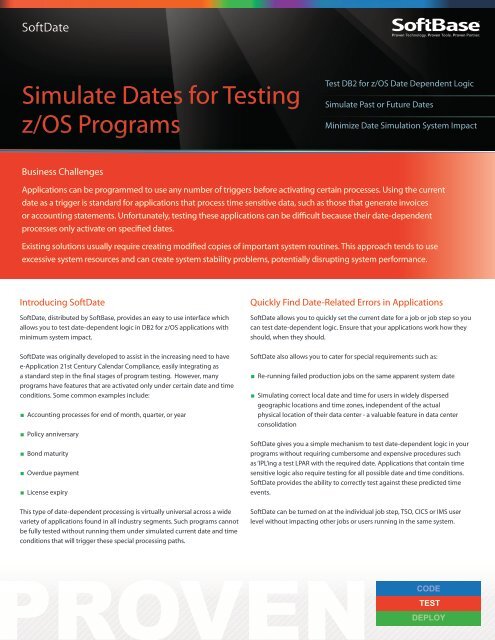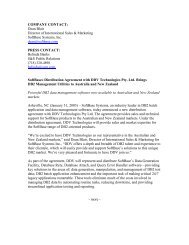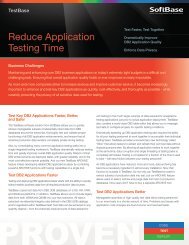SoftDate - SoftBase Systems, Inc.
SoftDate - SoftBase Systems, Inc.
SoftDate - SoftBase Systems, Inc.
Create successful ePaper yourself
Turn your PDF publications into a flip-book with our unique Google optimized e-Paper software.
<strong>SoftDate</strong><br />
Simulate Dates for Testing<br />
z/OS Programs<br />
Test DB2 for z/OS Date Dependent Logic<br />
Simulate Past or Future Dates<br />
Minimize Date Simulation System Impact<br />
Business Challenges<br />
Applications can be programmed to use any number of triggers before activating certain processes. Using the current<br />
date as a trigger is standard for applications that process time sensitive data, such as those that generate invoices<br />
or accounting statements. Unfortunately, testing these applications can be difficult because their date-dependent<br />
processes only activate on specified dates.<br />
Existing solutions usually require creating modified copies of important system routines. This approach tends to use<br />
excessive system resources and can create system stability problems, potentially disrupting system performance.<br />
Introducing <strong>SoftDate</strong><br />
<strong>SoftDate</strong>, distributed by <strong>SoftBase</strong>, provides an easy to use interface which<br />
allows you to test date-dependent logic in DB2 for z/OS applications with<br />
minimum system impact.<br />
Quickly Find Date-Related Errors in Applications<br />
<strong>SoftDate</strong> allows you to quickly set the current date for a job or job step so you<br />
can test date-dependent logic. Ensure that your applications work how they<br />
should, when they should.<br />
<strong>SoftDate</strong> was originally developed to assist in the increasing need to have<br />
e-Application 21st Century Calendar Compliance, easily integrating as<br />
a standard step in the final stages of program testing. However, many<br />
programs have features that are activated only under certain date and time<br />
conditions. Some common examples include:<br />
■■<br />
Accounting processes for end of month, quarter, or year<br />
■■<br />
Policy anniversary<br />
■■<br />
Bond maturity<br />
■■<br />
Overdue payment<br />
■■<br />
License expiry<br />
<strong>SoftDate</strong> also allows you to cater for special requirements such as:<br />
■■<br />
Re-running failed production jobs on the same apparent system date<br />
■■<br />
Simulating correct local date and time for users in widely dispersed<br />
geographic locations and time zones, independent of the actual<br />
physical location of their data center - a valuable feature in data center<br />
consolidation<br />
<strong>SoftDate</strong> gives you a simple mechanism to test date-dependent logic in your<br />
programs without requiring cumbersome and expensive procedures such<br />
as ‘IPL’ing a test LPAR with the required date. Applications that contain time<br />
sensitive logic also require testing for all possible date and time conditions.<br />
<strong>SoftDate</strong> provides the ability to correctly test against these predicted time<br />
events.<br />
This type of date-dependent processing is virtually universal across a wide<br />
variety of applications found in all industry segments. Such programs cannot<br />
be fully tested without running them under simulated current date and time<br />
conditions that will trigger these special processing paths.<br />
<strong>SoftDate</strong> can be turned on at the individual job step, TSO, CICS or IMS user<br />
level without impacting other jobs or users running in the same system.<br />
ROVEN<br />
CODE<br />
TEST<br />
DEPLOY
<strong>SoftDate</strong><br />
Simulate Dates for Testing z/OS Programs<br />
Safely Test with <strong>SoftDate</strong>’s Minimum Impact Approach<br />
<strong>SoftDate</strong> works by dynamically front-ending system routines used to obtain<br />
the current date and time. This front-ending occurs only in regions where it<br />
is required. Other regions and system processes that do not require <strong>SoftDate</strong><br />
are completely unaffected.<br />
In cases where it is needed, <strong>SoftDate</strong> lets the system routine return the<br />
current date and time and then applies the adjustment factor requested by<br />
the user.<br />
Avoid Costly Overhead and System Stability Problems<br />
Past approaches to date simulation have invariably involved creating<br />
modified versions of key system routines. These patched routines then allow<br />
the simulation product to gain control whenever any program running in<br />
the z/OS system requests the system date or time. The product then typically<br />
scans its own internal tables to determine if the caller requires a simulated<br />
date, and returns the simulated value if so, otherwise passing the call off to<br />
the standard system routine. This is a high impact approach because:<br />
■■<br />
Every date request issued by any program running in the z/OS system will<br />
incur overhead. Date requests are issued by many system components<br />
as well as application programs and there can easily be thousands or<br />
more of these per second in a busy z/OS system. The additional overhead<br />
introduced by the simulator will be a substantial cost, particularly when<br />
you consider at times there could be no or few actual users of it, but yet<br />
every process running on the z/OS system is still penalized.<br />
■■<br />
The entire z/OS system will be exposed to any stability problems (bugs)<br />
that may exist in the product. By contrast, the <strong>SoftDate</strong> approach confines<br />
its impact to only those regions and users that actually require it. Apart<br />
from two trivial exceptions, there is zero impact from <strong>SoftDate</strong> on regions<br />
which are not actively using it. There are no permanent changes to any<br />
system routines, and any region that is running without <strong>SoftDate</strong> active<br />
will execute only standard, unmodified system code.<br />
Additional <strong>SoftDate</strong> Features and Benefits<br />
There are a variety of unique <strong>SoftDate</strong> features and options that supply<br />
benefits relating to increased productivity and the reduction of risk:<br />
■■<br />
Supports Java workloads running under z/OS Unix System Services and<br />
WebSphere Application Server.<br />
■■<br />
Has a powerful and intuitive ISPF front end for defining rules to specify<br />
jobs that require <strong>SoftDate</strong>, meaning you can test with <strong>SoftDate</strong> without<br />
having to make JCL changes.<br />
■■<br />
Offers unrivalled flexibility in rules specification and security controls<br />
■■<br />
Assists Sarbanes-Oxley compliance for testing date compliance and to<br />
protect profit by pre-empting risks of date errors and related issues.<br />
■■<br />
Assists Basel II compliance with risk management testing, protecting<br />
your data assets and those transactions running with them.<br />
■■<br />
Does not make permanent changes to critical system routines.<br />
■■<br />
Is under a program of active support and development.<br />
About <strong>SoftBase</strong><br />
<strong>SoftBase</strong> <strong>Systems</strong> is committed to creating a better DB2 development experience. By combining decades of DB2 expertise with a set of proven DB2 testing<br />
and performance-tuning tools and an unmatched customer support team, <strong>SoftBase</strong> delivers – helping application developers and DB2 administrators create<br />
reliable, high-quality DB2 applications faster and with ease. With <strong>SoftBase</strong> you can count on tools that work as promised, and a knowledgeable support<br />
team available 24/7 to answer questions. That’s <strong>SoftBase</strong>: Proven Technology. Proven Tools. Proven Partner.<br />
For information, call 800.669.7076 or visit softbase.com







